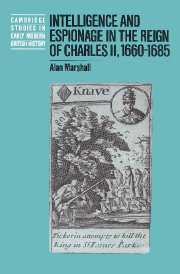Book contents
- Frontmatter
- Contents
- Acknowledgements
- List of abbreviations
- Introduction
- 1 The Restoration secretariat and intelligence, 1660–1685
- 2 Intelligence and the Post Office
- 3 Local intelligence networks in the north of England
- 4 ‘Taking the ruffian's wage’: spies, an overview
- 5 The spies of the early Restoration regime, 1660–1669
- 6 The spies of the later Restoration regime, 1667–1685
- 7 The foreign and diplomatic scene
- 8 Assassination: ‘an Italian trick, not used in England’
- Conclusion
- Bibliography
- Index
- Cambridge Studies in Early Modern British History
5 - The spies of the early Restoration regime, 1660–1669
Published online by Cambridge University Press: 29 September 2009
- Frontmatter
- Contents
- Acknowledgements
- List of abbreviations
- Introduction
- 1 The Restoration secretariat and intelligence, 1660–1685
- 2 Intelligence and the Post Office
- 3 Local intelligence networks in the north of England
- 4 ‘Taking the ruffian's wage’: spies, an overview
- 5 The spies of the early Restoration regime, 1660–1669
- 6 The spies of the later Restoration regime, 1667–1685
- 7 The foreign and diplomatic scene
- 8 Assassination: ‘an Italian trick, not used in England’
- Conclusion
- Bibliography
- Index
- Cambridge Studies in Early Modern British History
Summary
The 1660s were a time of trial for the Stuart regime. Rumours of republican conspiracies were rife, trouble was expected and four actual risings took place, in London in 1661, in Dublin and in the north of England in 1663 and in Scotland in 1666. The regime also had a problem with the exile community in the Netherlands which increased as it drifted into a war with the Dutch. To survive in the clandestine side of government and to counter its many problems the Stuart regime was forced to develop the use of spies and informers to penetrate and betray any potential plot and gain secret knowledge of foreign affairs. In the following pages it has been possible to trace the careers of some of the men who were used by the regime for this work.
The history of the alleged Tonge Plot of 1662 has long been a contentious one. Two sides to the argument which emerged over the break-up of this supposed design exist. The first viewpoint has it that the scheme was at least partly genuine and that minor figures who were arrested, convicted and executed were part of a more general and nation-wide scheme. The second view, however, was that the plot had little validity outside the fevered and greedy imaginations of a group of agents provocateurs, who were mainly concerned to exploit the situation as much as they could; moreover that what emerged was then taken up by a rattled government, who ruthlessly exploited it in parliament and sent a group of, comparatively, innocent, and certainly misguided, men to a bloody death for its own purposes.
- Type
- Chapter
- Information
- Intelligence and Espionage in the Reign of Charles II, 1660–1685 , pp. 142 - 185Publisher: Cambridge University PressPrint publication year: 1994
- 1
- Cited by



